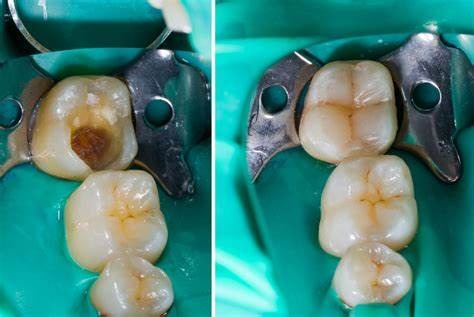Understanding Tooth Fillings: Importance, Painlessness, and the Risks of Ignoring Cavities
"But doc, how do I prevent the tooth from going into the process of root canal?" Lets understand tooth fillings then
Dr. Amrit Pal Singh
2/29/20242 min read


Welcome to Kraft 32's dental blog, where we aim to provide you with valuable insights into maintaining optimal oral health.
Today, we delve into the world of tooth fillings – exploring their significance, dispelling common myths about their pain, and shedding light on the consequences of neglecting cavities.
The Importance of Tooth Fillings:
Tooth fillings play a crucial role in preserving the structure and function of your teeth. When a tooth develops a cavity, it creates a small hole in the enamel, the outer layer of your tooth. If left untreated, cavities can deepen, leading to more extensive damage, such as infections or even tooth loss. Fillings help to restore the integrity of the tooth by filling in these cavities, preventing further decay and preserving your oral health.
Painless Procedure:
One of the most common misconceptions about tooth fillings is that they are painful. However, modern dental techniques and advancements in materials have made the filling process virtually painless for most patients. Before the procedure begins, your dentist will administer local anesthesia to numb the area around the affected tooth, ensuring that you feel minimal discomfort during the treatment. Additionally, dentists utilize techniques to make the experience as comfortable as possible, ensuring that you can leave with a healthy smile and minimal discomfort.
Consequences of Ignoring Cavities:
Ignoring cavities can have serious implications for your oral health. As cavities progress, they can extend deeper into the tooth, reaching the sensitive inner layers where the nerves and blood vessels are located. This can lead to intense toothaches, increased sensitivity to hot and cold temperatures, and eventually, infections that may require more invasive treatments such as root canals or extractions. Moreover, untreated cavities can contribute to the spread of bacteria in the mouth, increasing the risk of gum disease and other oral health issues. By addressing cavities promptly with fillings, you can prevent these complications and maintain a healthy smile for years to come.
Conclusion:
Tooth fillings are a simple yet essential aspect of dental care, helping to preserve the health and function of your teeth. Contrary to popular belief, the filling process is typically painless, thanks to advancements in dental technology and techniques. By addressing cavities early with fillings, you can avoid more extensive dental problems down the road and enjoy a lifetime of healthy smiles. Remember to schedule regular dental check-ups to catch any cavities early and maintain optimal oral health. Your smile deserves the best care possible, so don't hesitate to reach out to your dentist if you have any concerns about cavities or tooth fillings.
